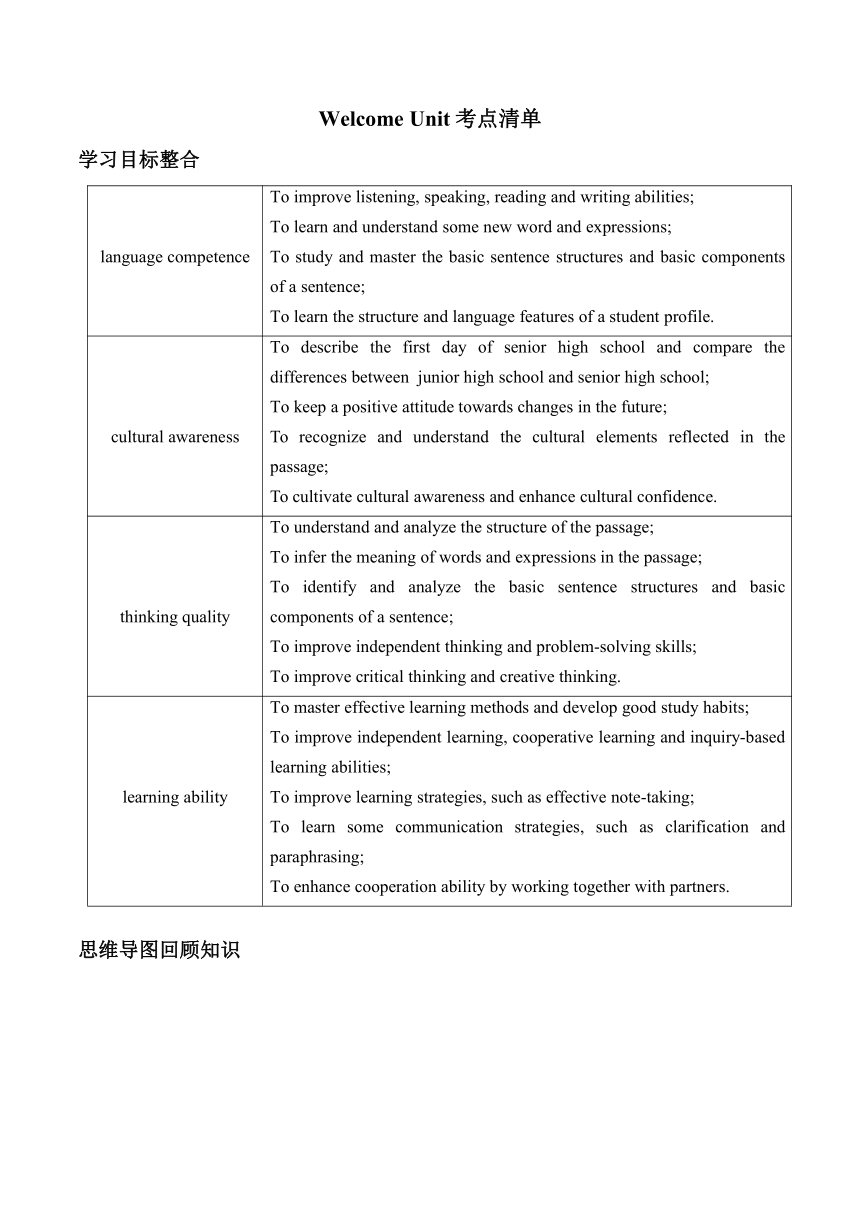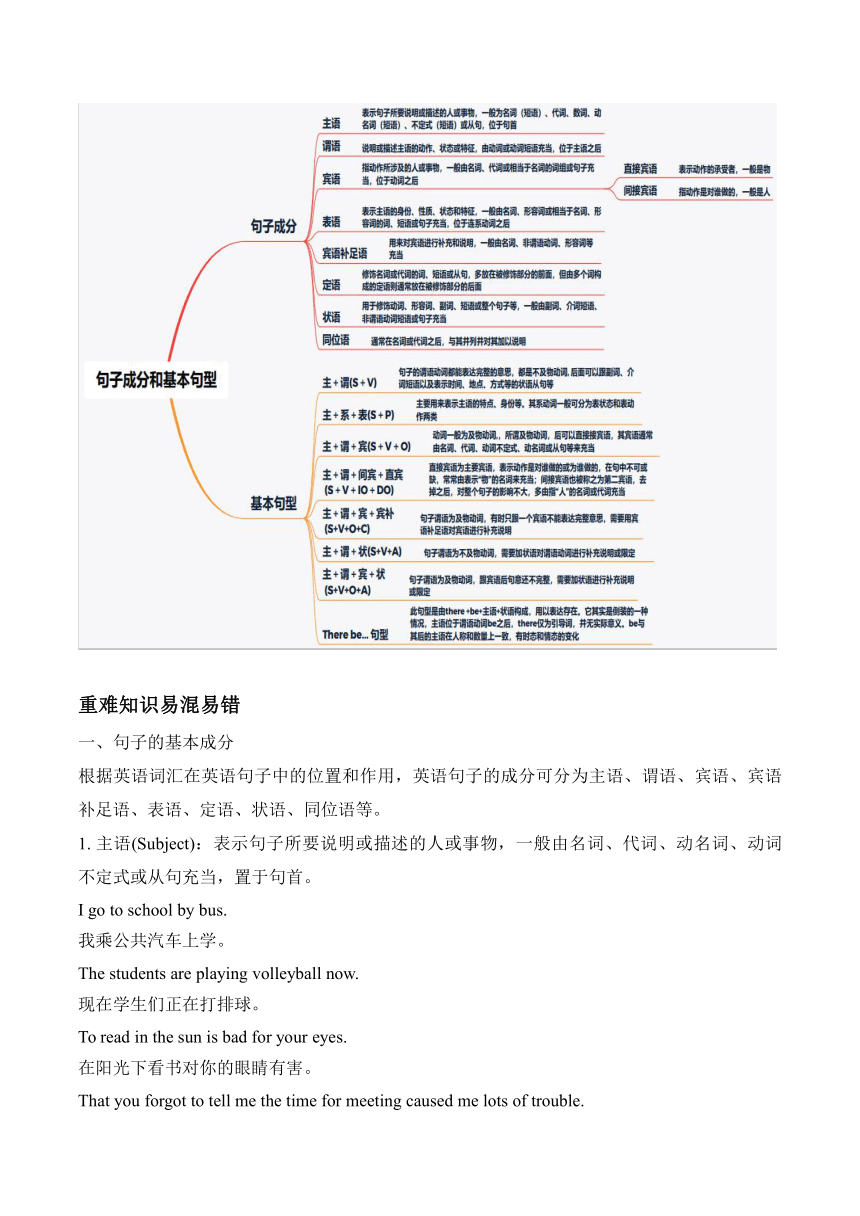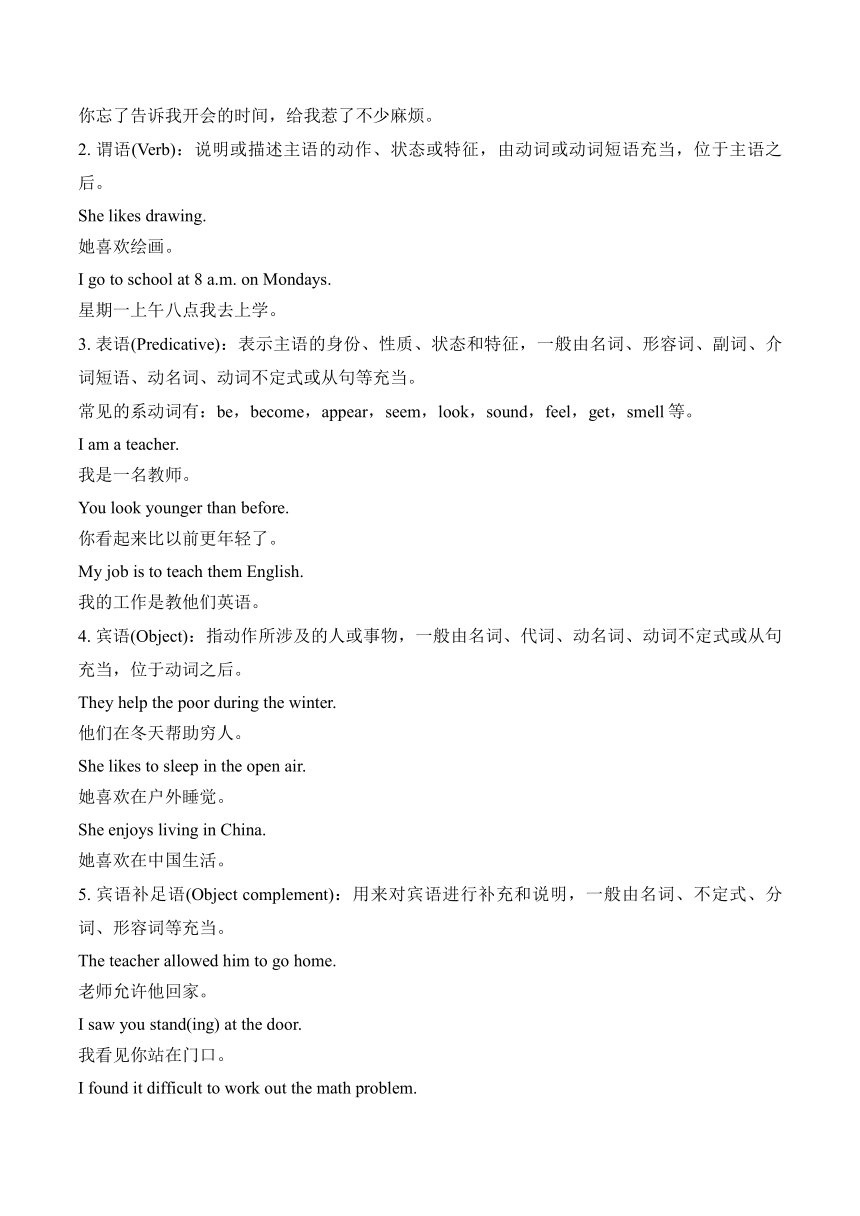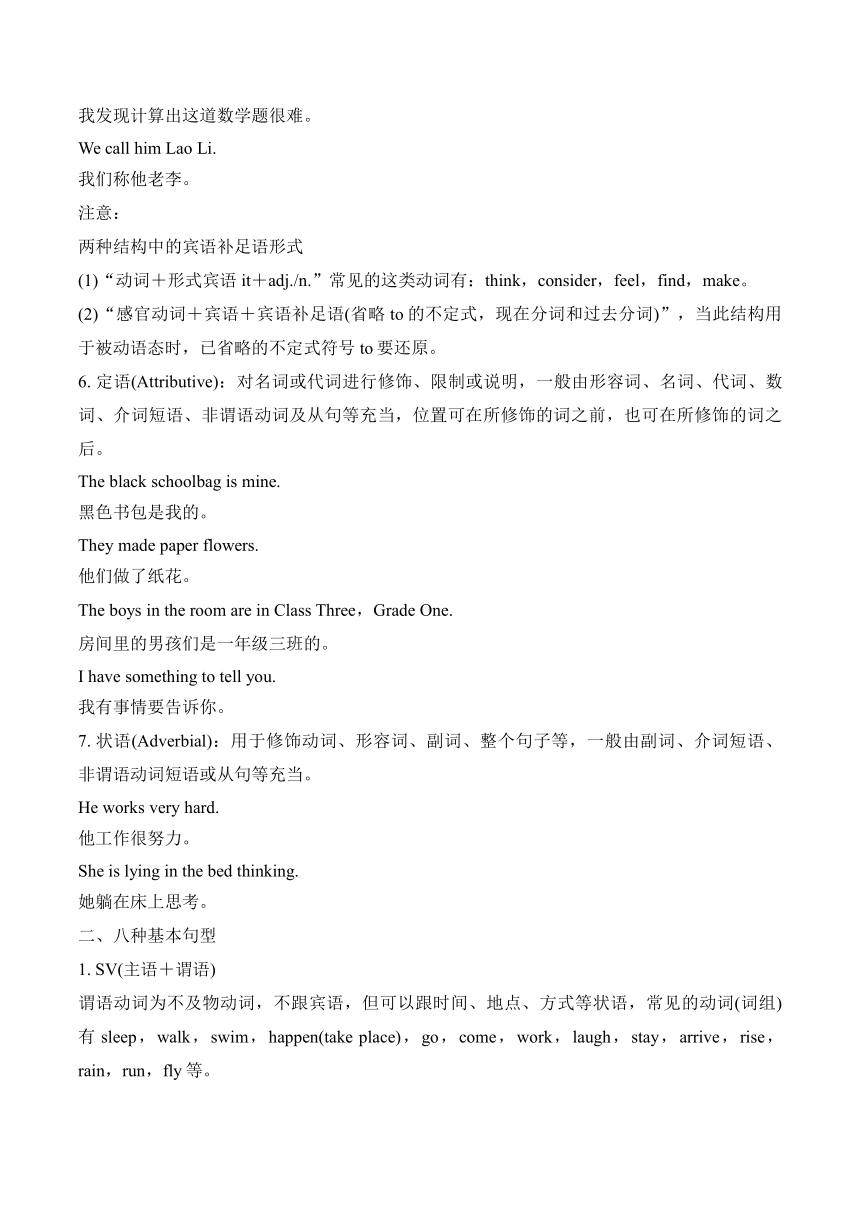人教版(2019)必修 第一册Welcome Unit 考点清单学案(含答案)
文档属性
| 名称 | 人教版(2019)必修 第一册Welcome Unit 考点清单学案(含答案) |

|
|
| 格式 | docx | ||
| 文件大小 | 350.9KB | ||
| 资源类型 | 教案 | ||
| 版本资源 | 人教版(2019) | ||
| 科目 | 英语 | ||
| 更新时间 | 2024-12-18 00:00:00 | ||
图片预览





文档简介
Welcome Unit考点清单
学习目标整合
language competence To improve listening, speaking, reading and writing abilities; To learn and understand some new word and expressions; To study and master the basic sentence structures and basic components of a sentence; To learn the structure and language features of a student profile.
cultural awareness To describe the first day of senior high school and compare the differences between junior high school and senior high school; To keep a positive attitude towards changes in the future; To recognize and understand the cultural elements reflected in the passage; To cultivate cultural awareness and enhance cultural confidence.
thinking quality To understand and analyze the structure of the passage; To infer the meaning of words and expressions in the passage; To identify and analyze the basic sentence structures and basic components of a sentence; To improve independent thinking and problem-solving skills; To improve critical thinking and creative thinking.
learning ability To master effective learning methods and develop good study habits; To improve independent learning, cooperative learning and inquiry-based learning abilities; To improve learning strategies, such as effective note-taking; To learn some communication strategies, such as clarification and paraphrasing; To enhance cooperation ability by working together with partners.
思维导图回顾知识
重难知识易混易错
一、句子的基本成分
根据英语词汇在英语句子中的位置和作用,英语句子的成分可分为主语、谓语、宾语、宾语补足语、表语、定语、状语、同位语等。
1. 主语(Subject):表示句子所要说明或描述的人或事物,一般由名词、代词、动名词、动词不定式或从句充当,置于句首。
I go to school by bus.
我乘公共汽车上学。
The students are playing volleyball now.
现在学生们正在打排球。
To read in the sun is bad for your eyes.
在阳光下看书对你的眼睛有害。
That you forgot to tell me the time for meeting caused me lots of trouble.
你忘了告诉我开会的时间,给我惹了不少麻烦。
2. 谓语(Verb):说明或描述主语的动作、状态或特征,由动词或动词短语充当,位于主语之后。
She likes drawing.
她喜欢绘画。
I go to school at 8 a.m. on Mondays.
星期一上午八点我去上学。
3. 表语(Predicative):表示主语的身份、性质、状态和特征,一般由名词、形容词、副词、介词短语、动名词、动词不定式或从句等充当。
常见的系动词有:be,become,appear,seem,look,sound,feel,get,smell等。
I am a teacher.
我是一名教师。
You look younger than before.
你看起来比以前更年轻了。
My job is to teach them English.
我的工作是教他们英语。
4. 宾语(Object):指动作所涉及的人或事物,一般由名词、代词、动名词、动词不定式或从句充当,位于动词之后。
They help the poor during the winter.
他们在冬天帮助穷人。
She likes to sleep in the open air.
她喜欢在户外睡觉。
She enjoys living in China.
她喜欢在中国生活。
5. 宾语补足语(Object complement):用来对宾语进行补充和说明,一般由名词、不定式、分词、形容词等充当。
The teacher allowed him to go home.
老师允许他回家。
I saw you stand(ing) at the door.
我看见你站在门口。
I found it difficult to work out the math problem.
我发现计算出这道数学题很难。
We call him Lao Li.
我们称他老李。
注意:
两种结构中的宾语补足语形式
(1)“动词+形式宾语it+adj./n.”常见的这类动词有:think,consider,feel,find,make。
(2)“感官动词+宾语+宾语补足语(省略to的不定式,现在分词和过去分词)”,当此结构用于被动语态时,已省略的不定式符号to要还原。
6. 定语(Attributive):对名词或代词进行修饰、限制或说明,一般由形容词、名词、代词、数词、介词短语、非谓语动词及从句等充当,位置可在所修饰的词之前,也可在所修饰的词之后。
The black schoolbag is mine.
黑色书包是我的。
They made paper flowers.
他们做了纸花。
The boys in the room are in Class Three,Grade One.
房间里的男孩们是一年级三班的。
I have something to tell you.
我有事情要告诉你。
7. 状语(Adverbial):用于修饰动词、形容词、副词、整个句子等,一般由副词、介词短语、非谓语动词短语或从句等充当。
He works very hard.
他工作很努力。
She is lying in the bed thinking.
她躺在床上思考。
二、八种基本句型
1. SV(主语+谓语)
谓语动词为不及物动词,不跟宾语,但可以跟时间、地点、方式等状语,常见的动词(词组)有sleep,walk,swim,happen(take place),go,come,work,laugh,stay,arrive,rise,rain,run,fly等。
They laughed.
他们大笑。
2. SVO(主语+谓语+宾语)
谓语动词均为及物动词,常见的动词有like,love,want,stop,hope,help,refuse,finish,eat,have,appreciate,water,make等。
I enjoy working with you.
我喜欢和你一起工作。
I hope to see you again.
我希望再次见到你。
3. SP(主语+系动词+表语)
谓语动词均为系动词,常见的系动词有:be,keep,look,feel,smell,sound,taste,grow,get,go,turn,become,seem,appear等。
Tom looks thin.
汤姆看起来瘦。
The food smells delicious.
这食物闻起来很香。
4. SVIODO(主语+谓语+间接宾语+直接宾语)
通常情况下,间接宾语(通常指人)位于直接宾语(通常指物)的前面,但有时根据需要,间接宾语位于直接宾语之后,这时要在间接宾语前加to或for。常用于该句型的动词有give,show,send,bring,read,pass,lend,leave,hand,tell,return,write,throw,make,buy,do,get,order,sing,pay等。
I gave her a present.
=I gave a present to her.
我给了她一件礼物。
I bought him a pen.
=I bought a pen for him.
我给他买了一支钢笔。
5. SVOOC(主语+谓语+宾语+宾语补足语)
宾语补足语部分可以为形容词、名词、不定式、分词等形式。常用于该句型的动词(短语)有call,name,make,think,find,leave,see,watch,look at,listen to,hear,feel,let,have,get,keep,allow,need,want,ask等。其中宾语与宾语补足语统称为复合宾语。
We call him Jack.
我们叫他杰克。
I found the movie interesting.
我觉得这部电影很有意思。
They asked me to help them.
他们让我帮助他们。
当“感官动词或使役动词+宾语+宾语补足语”结构中的宾语补足语是省略to的动词不定式且用于被动语态时,省略的to要再添加上。例如:My mother made me wash dishes.→I was made to wash dishes by my mother.
6. SVA(主语+谓语+状语)
The children stayed in the room.
孩子们待在房间里。
He runs slowly in the park every day.
每天他在公园里慢跑。
7. SVOA(主语+谓语+宾语+状语)
You can put the plate here.
你能把盘子放在这儿。
He speaks English very well.
他英语说得非常好。
8. There be...(there+系动词...)
There be后面的名词是句子的主语,属倒装结构,且动词除be外,还有:lie,stand,used to be,seem to be,appear to be等。
There is a book and two cups on the table.
桌子上有一本书和两个杯子。
There are some apples in the bowl.
碗里有一些苹果。
There be句型的就近原则
There be句型中的be动词的形式应和其后紧挨着的主语一致,即“就近原则”。
句型中动词be可以为一般现在时,一般过去时,将来时和完成时。
练习:
翻译句子
1.我们发现Tom 很自信。(主谓宾宾补)
_____________________________________________________________________
2.我是一名16岁的男孩。(主系表)
_____________________________________________________________________
3.树将要变绿了(主系表)
_____________________________________________________________________
4.我们计划这周六取看望父母。(主谓宾状)
_____________________________________________________________________
5.我已经在这里交了很多好朋友。(主谓宾状)
_____________________________________________________________________
6.我现在正在一所高中学习。(主谓状)
_____________________________________________________________________
7.这个故事使所有的学生都很开心。(主谓宾宾补)
_____________________________________________________________________
8.昨天我们英语老师给我们讲了一则故事。(主谓双宾)
_____________________________________________________________________
答案:
1.答案:We found Tom very confident.
2.答案:I am a 16-year-old boy.
3.答案:The trees will turn green.
4.答案:We plan/ are going to visit our parents this Saturday.
5.答案:I have made many good friends here.
6.答案:I am studying in a senior high school now.
7.答案:The story made all the students very happy.
8.答案:Our English teacher told us a story yesterday.
核心素养对接高考
一、阅读理解
It's school time again! You're probably feeling excited and maybe a little sad that the summer vacation is over. Some kids feel nervous, anxious or a little frightened on the first day of school because of all the new things; new teachers, new friends, and even a new school. Luckily, these "new" worries only stick around for a little while. Let's find out more about going to a new school.
Most teachers kick off the new school year by introducing themselves and talking about all the stuff you'll be doing that year. Some teachers give students a chance to tell something about themselves to the rest of the class, too. When teachers do the talking on the first day, they often read classroom rules and school rules to you so you'll know what's allowed and what's not. Please pay close attention.
You might already know a lot of people in your class on the first day, but it's a great day to make new friends, so try to say hello to kids you know and new ones that you don't know. In this way, you'll make a good first impression on your new partners.
Seeing friends you haven't seen for some time can make the first day a good one. You can make the day special by wearing clothes that you really like. Maybe you got a great T-shirt on one of your vacations, or a pair of sneakers. It also can make you feel good to be prepared and have all the things you need, such as pencils, folders, and whatever else you'll need. But make sure that you organize them in advance in case you don't have time in the morning.
1. What do the underlined words "kick off" in the second paragraph probably mean
A. Start. B. Study. C. Find. D. Teach.
2. What will you do on the first day of school according to the passage
A. Share a story. B. Learn about the school rules.
C. Argue with new friends. D. Revise new lessons.
3. According to the passage, if you happen to see an old friend on the first day of school, how will you feel
A. Nervous. B. Sad. C. Happy. D. Worried.
4. What does the last paragraph mainly tell us
A. What to know about a new school.
B. How to prepare for the first day of a new school.
C. What to do on your first day of school.
D. How to spend your first day of school.
二、七选五
Going from middle school to the freshman year of high school is a big change. ①__________
Be open to new friendships.
High school is all about experiencing new things, including new friendships. Getting to know people you haven’t met before is a great way to broaden your horizons. ②__________ Simply sitting with a new person at lunch can be enough to get the ball rolling.
Explore the campus.
For most people, going off to senior high school means heading to a completely new campus. ③__________ They might be able to show you around the campus, which will make you a bit more confident as you go on with your freshman year.
Get organised.
Senior high school and junior high school are very different. ④__________ You can buy a planner and spend a few minutes each night going over the notes you took in class that day. Staying on top of your studies will make the transition(过渡) from middle school to high school much easier.
⑤__________
While there’s no need to plan every day for the next three years, it can’t hurt to make a note of classes you want to take or activities you’d like to try. Believe it or not, the three years will go by really fast. Having a plan in place will help you make the most of your high school experience.
A. Create a three-year plan.
B. Be open to new experiences.
C. If you’re nervous, start small.
D. That way, you’ll have a better idea of some of the things you can expect.
E. Try to get as organised as possible so you can stay on top of your studies.
F. If you worry about the unknown, reach out to the school and see if someone can help.
G. Here are some ways to help you deal with anxiety and prepare for the first year.
三、书面表达
假如你是李华。最近你的好友林浩来信说他升入高中以后感到不太适应,不知道如何结交新朋友。请用英文给他回信,给出一些建议,主要内容包括:
1. 面带微笑,对人友好;
2. 乐于助人,学会倾听。
注意:
1. 词数80左右(开头和结尾已给出,不计入总词数);
2. 可适当增加细节,以使行文连贯。
Dear Lin Hao,
______________________________________________________________________________________________________________________________________________________________________________________________________________________________________________________________________________________________________________________________________________________________________________________________________________________________________________________________________________________________________
Yours,
Li Hua
答案以及解析
一、阅读理解
1.答案:A
解析:词义猜测题。根据画线短语后的“the new school year by introducing themselves”可知,在新学年大家都不认识,自我介绍显然是大部分老师教学工作的开始。故选A。
2.答案:B
解析:细节理解题。根据第二段倒数第二句中的“they often read classroom rules and school rules to you so you'll know what's allowed and what's not”可知,在开学的第一天学生要了解学校的规章制度。故选B。
3.答案:C
解析:推理判断题。根据最后一段第一句可知,遇到一段时间没见的朋友会让第一天成为一个好日子,故可以推断在开学第一天遇到老朋友会让人感觉非常高兴。故选C。
4.答案:B
解析:主旨大意题。从最后一段中的“wearing clothes” “be prepared and have all the things you need, such as pencils, folders, and whatever else you'll need” “organise them in advance”可知这里谈到了穿什么样的衣服、准备什么物品,并且叮嘱我们要提前筹备,所以最后一段告诉我们如何为新学校的第一天做准备。故选B。
二、七选五
答案:GCFEA
解析:①根据上文“Going from middle school to freshman year of high school is a big challenge.(从初中到高一是一个很大的挑战。)”可知,本句引起全文话题,而下文中出现了小标题,说明这里需要一个过渡句承上启下,G项“以下是一些帮助你处理焦虑情绪并为第一年做好准备的方法。”符合语境。故选G。
②根据上文“Getting to know people you haven’t met before is a great way to broaden your horizons.(结识你从未见过的人是拓宽你视野的好方法。)”和下文“Simply sitting with a new person at lunch can be enough to get the ball rolling.(仅仅是和一个陌生人共进午餐就足以让事情开始发展。)”可知,与陌生人接触是可以增加人脉的方法之一,比如共进午餐就可以作为发展关系的开始。C项“如果你紧张,从小事做起。”符合语境,其中“start small”可以对应“at lunch”这件小事。故选C。
③根据上文“For most people, going off to high school means heading off to a new campus.(对大多数人来说,上高中意味着要去一个新的校园。)”以及后文“They might be able to show you around the campus, which will make you a bit more comfortable as you go on with your freshman year.(他们可能会带你参观校园,这会让你在高一的时候更舒服一些。)”可知,上文提到了去新校园,后文提到了有人带你参观校园,可知本句是在建议联系学校,寻求帮助。故F选项“如果你对未知的事情感到担心,那就联系学校,看看是否有人能帮你。”符合语境。故选F。
④根据上文“High school and middle school are very different in studying.(高中和初中在学习上有很大的不同。)”和下文“You can buy a planner and spend a few minutes each night going over the notes you took in class that day. (你可以买一个记事本,每天晚上花几分钟复习你当天在课堂上做的笔记。)”可知,本段主要讲述在学习方面初高中的不同,作者也给出具体的建议:对于学习有所整理。E项“尽可能有条理,这样你就可以学得很好。”符合语境,其中“as organized as possible(尽可能有条理)”与小标题“Get organized.(要有条理。)”对应。故选E。
⑤根据本段内容“While there’s no need to plan every day for the next three years, it can’t hurt to make a note of classes you want to take or activities you’d like to try. Believe it or not, the three years go by really fast. Having a plan in place will help you make the most of your high school experience.(虽然没有必要为未来三年的每一天做计划,但把你想参加的课程或想尝试的活动记下来也无妨。信不信由你,三年过得真快。有一个适当的计划将帮助你充分利用你的高中经历。)”可知,本段的主旨是建议制定一个三年计划。故A选项“制定一个三年计划。”符合语境,故选A。
三、书面表达
答案:
Dear Lin Hao,
I'm glad to receive your letter. From your letter, I know you have difficulty making new friends in high school. My suggestions are as follows.
First, you should smile and try to be friendly when you meet people. You should also care-about your schoolmates. If you are always ready to help them, they will understand you better. Second, it is important for you to be a good listener. That way, when people are with you, they will feel comfortable and happy. Finally, it is better for you to take an active part in class activities where you can show your talent.
I hope my advice will be helpful to you.
Yours,
Li Hua
学习目标整合
language competence To improve listening, speaking, reading and writing abilities; To learn and understand some new word and expressions; To study and master the basic sentence structures and basic components of a sentence; To learn the structure and language features of a student profile.
cultural awareness To describe the first day of senior high school and compare the differences between junior high school and senior high school; To keep a positive attitude towards changes in the future; To recognize and understand the cultural elements reflected in the passage; To cultivate cultural awareness and enhance cultural confidence.
thinking quality To understand and analyze the structure of the passage; To infer the meaning of words and expressions in the passage; To identify and analyze the basic sentence structures and basic components of a sentence; To improve independent thinking and problem-solving skills; To improve critical thinking and creative thinking.
learning ability To master effective learning methods and develop good study habits; To improve independent learning, cooperative learning and inquiry-based learning abilities; To improve learning strategies, such as effective note-taking; To learn some communication strategies, such as clarification and paraphrasing; To enhance cooperation ability by working together with partners.
思维导图回顾知识
重难知识易混易错
一、句子的基本成分
根据英语词汇在英语句子中的位置和作用,英语句子的成分可分为主语、谓语、宾语、宾语补足语、表语、定语、状语、同位语等。
1. 主语(Subject):表示句子所要说明或描述的人或事物,一般由名词、代词、动名词、动词不定式或从句充当,置于句首。
I go to school by bus.
我乘公共汽车上学。
The students are playing volleyball now.
现在学生们正在打排球。
To read in the sun is bad for your eyes.
在阳光下看书对你的眼睛有害。
That you forgot to tell me the time for meeting caused me lots of trouble.
你忘了告诉我开会的时间,给我惹了不少麻烦。
2. 谓语(Verb):说明或描述主语的动作、状态或特征,由动词或动词短语充当,位于主语之后。
She likes drawing.
她喜欢绘画。
I go to school at 8 a.m. on Mondays.
星期一上午八点我去上学。
3. 表语(Predicative):表示主语的身份、性质、状态和特征,一般由名词、形容词、副词、介词短语、动名词、动词不定式或从句等充当。
常见的系动词有:be,become,appear,seem,look,sound,feel,get,smell等。
I am a teacher.
我是一名教师。
You look younger than before.
你看起来比以前更年轻了。
My job is to teach them English.
我的工作是教他们英语。
4. 宾语(Object):指动作所涉及的人或事物,一般由名词、代词、动名词、动词不定式或从句充当,位于动词之后。
They help the poor during the winter.
他们在冬天帮助穷人。
She likes to sleep in the open air.
她喜欢在户外睡觉。
She enjoys living in China.
她喜欢在中国生活。
5. 宾语补足语(Object complement):用来对宾语进行补充和说明,一般由名词、不定式、分词、形容词等充当。
The teacher allowed him to go home.
老师允许他回家。
I saw you stand(ing) at the door.
我看见你站在门口。
I found it difficult to work out the math problem.
我发现计算出这道数学题很难。
We call him Lao Li.
我们称他老李。
注意:
两种结构中的宾语补足语形式
(1)“动词+形式宾语it+adj./n.”常见的这类动词有:think,consider,feel,find,make。
(2)“感官动词+宾语+宾语补足语(省略to的不定式,现在分词和过去分词)”,当此结构用于被动语态时,已省略的不定式符号to要还原。
6. 定语(Attributive):对名词或代词进行修饰、限制或说明,一般由形容词、名词、代词、数词、介词短语、非谓语动词及从句等充当,位置可在所修饰的词之前,也可在所修饰的词之后。
The black schoolbag is mine.
黑色书包是我的。
They made paper flowers.
他们做了纸花。
The boys in the room are in Class Three,Grade One.
房间里的男孩们是一年级三班的。
I have something to tell you.
我有事情要告诉你。
7. 状语(Adverbial):用于修饰动词、形容词、副词、整个句子等,一般由副词、介词短语、非谓语动词短语或从句等充当。
He works very hard.
他工作很努力。
She is lying in the bed thinking.
她躺在床上思考。
二、八种基本句型
1. SV(主语+谓语)
谓语动词为不及物动词,不跟宾语,但可以跟时间、地点、方式等状语,常见的动词(词组)有sleep,walk,swim,happen(take place),go,come,work,laugh,stay,arrive,rise,rain,run,fly等。
They laughed.
他们大笑。
2. SVO(主语+谓语+宾语)
谓语动词均为及物动词,常见的动词有like,love,want,stop,hope,help,refuse,finish,eat,have,appreciate,water,make等。
I enjoy working with you.
我喜欢和你一起工作。
I hope to see you again.
我希望再次见到你。
3. SP(主语+系动词+表语)
谓语动词均为系动词,常见的系动词有:be,keep,look,feel,smell,sound,taste,grow,get,go,turn,become,seem,appear等。
Tom looks thin.
汤姆看起来瘦。
The food smells delicious.
这食物闻起来很香。
4. SVIODO(主语+谓语+间接宾语+直接宾语)
通常情况下,间接宾语(通常指人)位于直接宾语(通常指物)的前面,但有时根据需要,间接宾语位于直接宾语之后,这时要在间接宾语前加to或for。常用于该句型的动词有give,show,send,bring,read,pass,lend,leave,hand,tell,return,write,throw,make,buy,do,get,order,sing,pay等。
I gave her a present.
=I gave a present to her.
我给了她一件礼物。
I bought him a pen.
=I bought a pen for him.
我给他买了一支钢笔。
5. SVOOC(主语+谓语+宾语+宾语补足语)
宾语补足语部分可以为形容词、名词、不定式、分词等形式。常用于该句型的动词(短语)有call,name,make,think,find,leave,see,watch,look at,listen to,hear,feel,let,have,get,keep,allow,need,want,ask等。其中宾语与宾语补足语统称为复合宾语。
We call him Jack.
我们叫他杰克。
I found the movie interesting.
我觉得这部电影很有意思。
They asked me to help them.
他们让我帮助他们。
当“感官动词或使役动词+宾语+宾语补足语”结构中的宾语补足语是省略to的动词不定式且用于被动语态时,省略的to要再添加上。例如:My mother made me wash dishes.→I was made to wash dishes by my mother.
6. SVA(主语+谓语+状语)
The children stayed in the room.
孩子们待在房间里。
He runs slowly in the park every day.
每天他在公园里慢跑。
7. SVOA(主语+谓语+宾语+状语)
You can put the plate here.
你能把盘子放在这儿。
He speaks English very well.
他英语说得非常好。
8. There be...(there+系动词...)
There be后面的名词是句子的主语,属倒装结构,且动词除be外,还有:lie,stand,used to be,seem to be,appear to be等。
There is a book and two cups on the table.
桌子上有一本书和两个杯子。
There are some apples in the bowl.
碗里有一些苹果。
There be句型的就近原则
There be句型中的be动词的形式应和其后紧挨着的主语一致,即“就近原则”。
句型中动词be可以为一般现在时,一般过去时,将来时和完成时。
练习:
翻译句子
1.我们发现Tom 很自信。(主谓宾宾补)
_____________________________________________________________________
2.我是一名16岁的男孩。(主系表)
_____________________________________________________________________
3.树将要变绿了(主系表)
_____________________________________________________________________
4.我们计划这周六取看望父母。(主谓宾状)
_____________________________________________________________________
5.我已经在这里交了很多好朋友。(主谓宾状)
_____________________________________________________________________
6.我现在正在一所高中学习。(主谓状)
_____________________________________________________________________
7.这个故事使所有的学生都很开心。(主谓宾宾补)
_____________________________________________________________________
8.昨天我们英语老师给我们讲了一则故事。(主谓双宾)
_____________________________________________________________________
答案:
1.答案:We found Tom very confident.
2.答案:I am a 16-year-old boy.
3.答案:The trees will turn green.
4.答案:We plan/ are going to visit our parents this Saturday.
5.答案:I have made many good friends here.
6.答案:I am studying in a senior high school now.
7.答案:The story made all the students very happy.
8.答案:Our English teacher told us a story yesterday.
核心素养对接高考
一、阅读理解
It's school time again! You're probably feeling excited and maybe a little sad that the summer vacation is over. Some kids feel nervous, anxious or a little frightened on the first day of school because of all the new things; new teachers, new friends, and even a new school. Luckily, these "new" worries only stick around for a little while. Let's find out more about going to a new school.
Most teachers kick off the new school year by introducing themselves and talking about all the stuff you'll be doing that year. Some teachers give students a chance to tell something about themselves to the rest of the class, too. When teachers do the talking on the first day, they often read classroom rules and school rules to you so you'll know what's allowed and what's not. Please pay close attention.
You might already know a lot of people in your class on the first day, but it's a great day to make new friends, so try to say hello to kids you know and new ones that you don't know. In this way, you'll make a good first impression on your new partners.
Seeing friends you haven't seen for some time can make the first day a good one. You can make the day special by wearing clothes that you really like. Maybe you got a great T-shirt on one of your vacations, or a pair of sneakers. It also can make you feel good to be prepared and have all the things you need, such as pencils, folders, and whatever else you'll need. But make sure that you organize them in advance in case you don't have time in the morning.
1. What do the underlined words "kick off" in the second paragraph probably mean
A. Start. B. Study. C. Find. D. Teach.
2. What will you do on the first day of school according to the passage
A. Share a story. B. Learn about the school rules.
C. Argue with new friends. D. Revise new lessons.
3. According to the passage, if you happen to see an old friend on the first day of school, how will you feel
A. Nervous. B. Sad. C. Happy. D. Worried.
4. What does the last paragraph mainly tell us
A. What to know about a new school.
B. How to prepare for the first day of a new school.
C. What to do on your first day of school.
D. How to spend your first day of school.
二、七选五
Going from middle school to the freshman year of high school is a big change. ①__________
Be open to new friendships.
High school is all about experiencing new things, including new friendships. Getting to know people you haven’t met before is a great way to broaden your horizons. ②__________ Simply sitting with a new person at lunch can be enough to get the ball rolling.
Explore the campus.
For most people, going off to senior high school means heading to a completely new campus. ③__________ They might be able to show you around the campus, which will make you a bit more confident as you go on with your freshman year.
Get organised.
Senior high school and junior high school are very different. ④__________ You can buy a planner and spend a few minutes each night going over the notes you took in class that day. Staying on top of your studies will make the transition(过渡) from middle school to high school much easier.
⑤__________
While there’s no need to plan every day for the next three years, it can’t hurt to make a note of classes you want to take or activities you’d like to try. Believe it or not, the three years will go by really fast. Having a plan in place will help you make the most of your high school experience.
A. Create a three-year plan.
B. Be open to new experiences.
C. If you’re nervous, start small.
D. That way, you’ll have a better idea of some of the things you can expect.
E. Try to get as organised as possible so you can stay on top of your studies.
F. If you worry about the unknown, reach out to the school and see if someone can help.
G. Here are some ways to help you deal with anxiety and prepare for the first year.
三、书面表达
假如你是李华。最近你的好友林浩来信说他升入高中以后感到不太适应,不知道如何结交新朋友。请用英文给他回信,给出一些建议,主要内容包括:
1. 面带微笑,对人友好;
2. 乐于助人,学会倾听。
注意:
1. 词数80左右(开头和结尾已给出,不计入总词数);
2. 可适当增加细节,以使行文连贯。
Dear Lin Hao,
______________________________________________________________________________________________________________________________________________________________________________________________________________________________________________________________________________________________________________________________________________________________________________________________________________________________________________________________________________________________________
Yours,
Li Hua
答案以及解析
一、阅读理解
1.答案:A
解析:词义猜测题。根据画线短语后的“the new school year by introducing themselves”可知,在新学年大家都不认识,自我介绍显然是大部分老师教学工作的开始。故选A。
2.答案:B
解析:细节理解题。根据第二段倒数第二句中的“they often read classroom rules and school rules to you so you'll know what's allowed and what's not”可知,在开学的第一天学生要了解学校的规章制度。故选B。
3.答案:C
解析:推理判断题。根据最后一段第一句可知,遇到一段时间没见的朋友会让第一天成为一个好日子,故可以推断在开学第一天遇到老朋友会让人感觉非常高兴。故选C。
4.答案:B
解析:主旨大意题。从最后一段中的“wearing clothes” “be prepared and have all the things you need, such as pencils, folders, and whatever else you'll need” “organise them in advance”可知这里谈到了穿什么样的衣服、准备什么物品,并且叮嘱我们要提前筹备,所以最后一段告诉我们如何为新学校的第一天做准备。故选B。
二、七选五
答案:GCFEA
解析:①根据上文“Going from middle school to freshman year of high school is a big challenge.(从初中到高一是一个很大的挑战。)”可知,本句引起全文话题,而下文中出现了小标题,说明这里需要一个过渡句承上启下,G项“以下是一些帮助你处理焦虑情绪并为第一年做好准备的方法。”符合语境。故选G。
②根据上文“Getting to know people you haven’t met before is a great way to broaden your horizons.(结识你从未见过的人是拓宽你视野的好方法。)”和下文“Simply sitting with a new person at lunch can be enough to get the ball rolling.(仅仅是和一个陌生人共进午餐就足以让事情开始发展。)”可知,与陌生人接触是可以增加人脉的方法之一,比如共进午餐就可以作为发展关系的开始。C项“如果你紧张,从小事做起。”符合语境,其中“start small”可以对应“at lunch”这件小事。故选C。
③根据上文“For most people, going off to high school means heading off to a new campus.(对大多数人来说,上高中意味着要去一个新的校园。)”以及后文“They might be able to show you around the campus, which will make you a bit more comfortable as you go on with your freshman year.(他们可能会带你参观校园,这会让你在高一的时候更舒服一些。)”可知,上文提到了去新校园,后文提到了有人带你参观校园,可知本句是在建议联系学校,寻求帮助。故F选项“如果你对未知的事情感到担心,那就联系学校,看看是否有人能帮你。”符合语境。故选F。
④根据上文“High school and middle school are very different in studying.(高中和初中在学习上有很大的不同。)”和下文“You can buy a planner and spend a few minutes each night going over the notes you took in class that day. (你可以买一个记事本,每天晚上花几分钟复习你当天在课堂上做的笔记。)”可知,本段主要讲述在学习方面初高中的不同,作者也给出具体的建议:对于学习有所整理。E项“尽可能有条理,这样你就可以学得很好。”符合语境,其中“as organized as possible(尽可能有条理)”与小标题“Get organized.(要有条理。)”对应。故选E。
⑤根据本段内容“While there’s no need to plan every day for the next three years, it can’t hurt to make a note of classes you want to take or activities you’d like to try. Believe it or not, the three years go by really fast. Having a plan in place will help you make the most of your high school experience.(虽然没有必要为未来三年的每一天做计划,但把你想参加的课程或想尝试的活动记下来也无妨。信不信由你,三年过得真快。有一个适当的计划将帮助你充分利用你的高中经历。)”可知,本段的主旨是建议制定一个三年计划。故A选项“制定一个三年计划。”符合语境,故选A。
三、书面表达
答案:
Dear Lin Hao,
I'm glad to receive your letter. From your letter, I know you have difficulty making new friends in high school. My suggestions are as follows.
First, you should smile and try to be friendly when you meet people. You should also care-about your schoolmates. If you are always ready to help them, they will understand you better. Second, it is important for you to be a good listener. That way, when people are with you, they will feel comfortable and happy. Finally, it is better for you to take an active part in class activities where you can show your talent.
I hope my advice will be helpful to you.
Yours,
Li Hua
